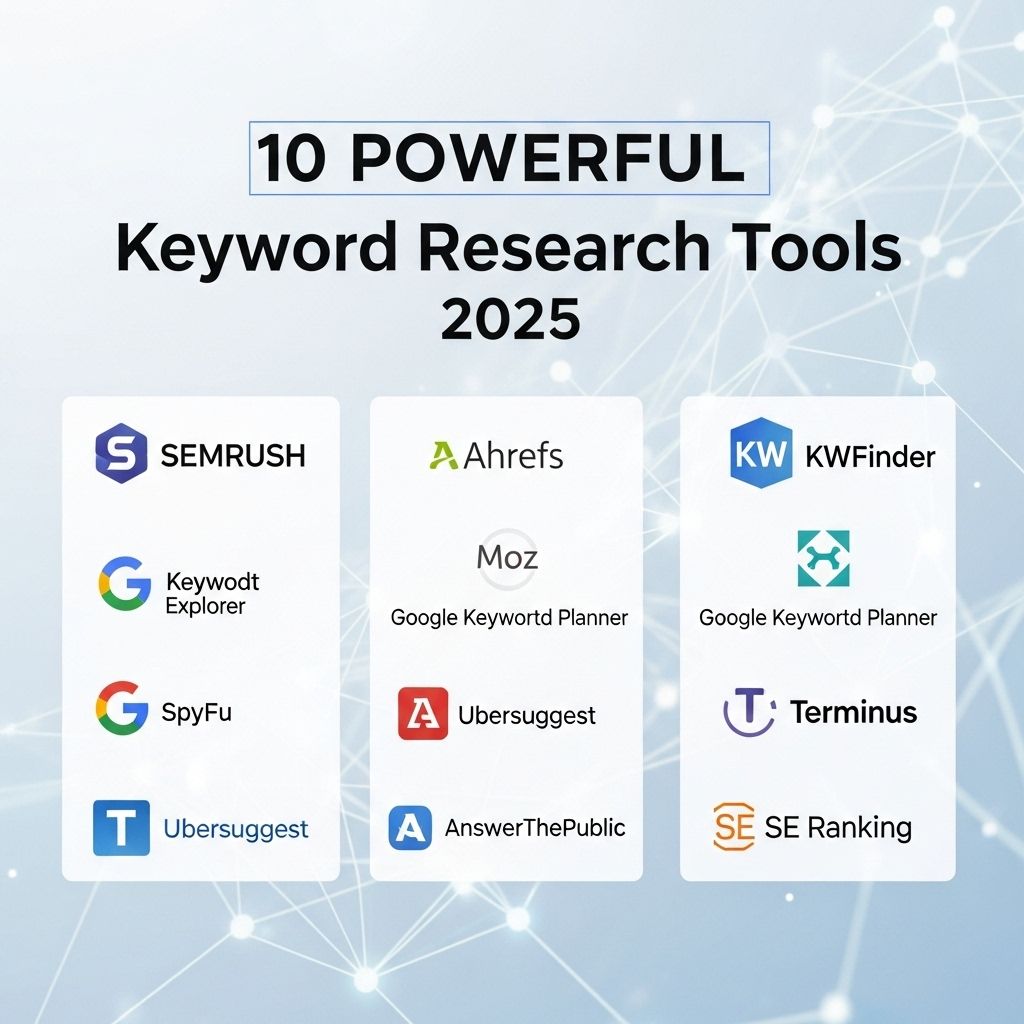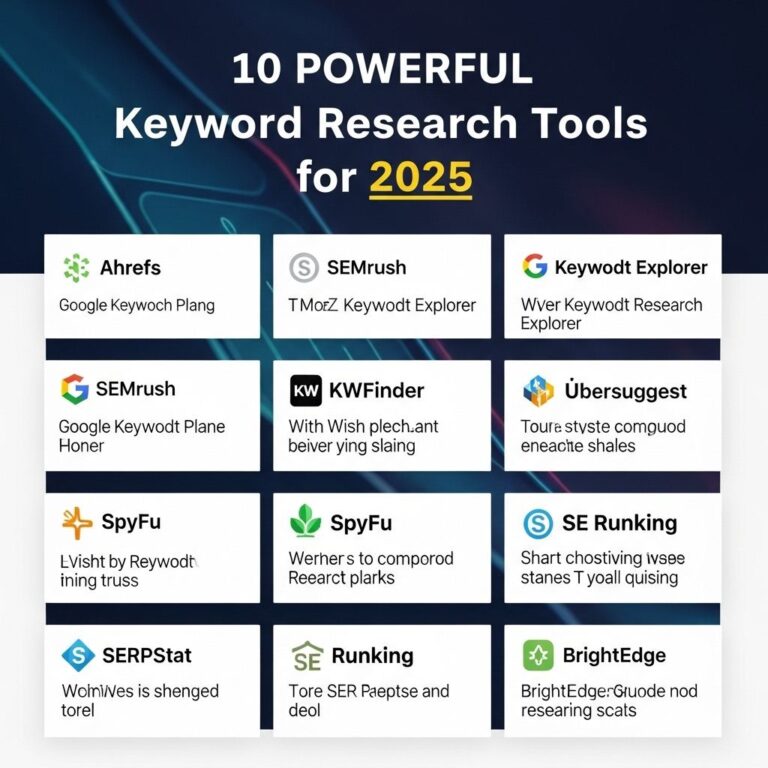In the ever-evolving landscape of SEO, keyword research remains a critical component for any successful digital marketing strategy. As we step into 2025, the tools available to marketers have become increasingly sophisticated, enabling deeper insights and more effective optimization strategies. This article explores ten powerful keyword research tools that are set to dominate in 2025, offering a blend of performance, usability, and unique features tailored to meet the needs of tech-savvy marketers.
Table of Contents
1. Ahrefs
Ahrefs continues to be a frontrunner in the keyword research arena. Known for its comprehensive database and user-friendly interface, it offers a wealth of features that help marketers uncover high-potential keywords.
- Features: Keyword Explorer, Site Audit, Content Explorer.
- Benefits: In-depth backlink analysis, SERP overview, and competitor analysis.
User Experience
Ahrefs boasts an intuitive design that simplifies the process of finding and analyzing keywords, making it highly accessible for both beginners and advanced users.
2. SEMrush
SEMrush is not just a keyword research tool; it’s a comprehensive marketing toolkit. In 2025, its capabilities have expanded to include more advanced features for keyword tracking and competitor analysis.
- Features: Keyword Magic Tool, Organic Research, PPC Keyword Tool.
- Benefits: Cross-channel optimization, comprehensive keyword suggestions, and trend tracking.
Competitive Analysis
One of SEMrush’s standout features is its ability to provide insights into the keywords your competitors rank for, helping you strategize effectively.
3. Moz Keyword Explorer
Moz has long been a staple in the SEO community, and its Keyword Explorer tool remains a powerful asset in 2025. With a focus on user-friendliness, Moz provides actionable data in a digestible format.
- Features: SERP analysis, keyword suggestions, and difficulty score.
- Benefits: Daily updates, integration with Moz Pro.
Custom Reports
The ability to create custom reports allows marketers to tailor their findings to specific campaigns or clients, enhancing presentation and clarity.
4. Google Keyword Planner
As a free tool from Google, Keyword Planner is an essential resource for any digital marketer. It provides insights directly from the source and is particularly useful for PPC campaigns.
- Features: Keyword suggestions, search volume, cost-per-click data.
- Benefits: No cost, reliable data sourced from Google.
Ideal for PPC Campaigns
For those focused on paid advertising, Google Keyword Planner offers precise metrics that help in budgeting and targeting.
5. Ubersuggest
Ubersuggest, created by Neil Patel, has gained traction for its simplicity and effectiveness. This tool is ideal for those who may not have the budget for more extensive suites.
- Features: Keyword suggestions, content ideas, SEO analysis.
- Benefits: Free version available, straightforward interface.
Keyword Ideas
Ubersuggest provides a variety of keyword ideas based on user input, making it an excellent tool for brainstorming sessions.
6. AnswerThePublic
For content-focused marketers, AnswerThePublic stands out by visualizing search queries and questions users have about specific keywords. This tool is invaluable for content ideation.
- Features: Search listening, visualization tools, data export.
- Benefits: Unique data presentation, community-driven insights.
Inspirational Content Generation
Marketers can generate blog topics and FAQs directly tied to user interests, enhancing engagement and relevance.
7. KWFinder
KWFinder has made a name for itself due to its powerful yet user-friendly interface. This tool is designed to help marketers find long-tail keywords with less competition.
- Features: SERP analysis, keyword difficulty score, and local keyword search.
- Benefits: Affordable pricing structure, intuitive design.
Long-Tail Keywords
Focusing on long-tail keywords helps capture niche markets, making KWFinder an invaluable asset for smaller businesses.
8. KeywordTool.io
This tool is particularly useful for social media marketers and those focused on content creation. KeywordTool.io provides a plethora of keyword suggestions across multiple platforms.
- Features: Google, YouTube, Amazon suggestions, and more.
- Benefits: Versatile application across various platforms.
Cross-Platform Functionality
By offering keyword suggestions for several platforms, marketers can create cohesive strategies across their digital presence.
9. Serpstat
Serpstat is a comprehensive SEO platform that combines keyword research with other essential functionalities like site audit and rank tracking.
- Features: Keyword research, site audit, rank tracking.
- Benefits: All-in-one solution for SEO and PPC.
Versatile Functionality
Serpstat’s versatility makes it suitable for businesses of all sizes looking to streamline their SEO efforts.
10. LongtailPro
LongtailPro is specially designed for finding long-tail keywords that can drive targeted traffic. Its focus on profitability makes it a unique player in the market.
- Features: Keyword competitiveness score, keyword research tool, and SERP analysis.
- Benefits: Focused on monetization, ideal for affiliate marketers.
Monetization Focus
This tool is particularly beneficial for affiliate marketers looking to optimize their content for profitability.
Conclusion
As we move deeper into 2025, the importance of robust keyword research tools cannot be overstated. The above-mentioned tools each offer unique features and benefits that empower marketers to craft data-driven strategies. Whether you are a seasoned SEO professional or a newcomer, investing time in selecting the right keyword research tool will undoubtedly yield significant returns. By leveraging these tools, marketers can stay ahead of the competition and ensure that their content is seen by the right audience at the right time.
FAQ
What are the best keyword research tools for 2025?
Some of the top keyword research tools for 2025 include Ahrefs, SEMrush, Moz Keyword Explorer, Ubersuggest, and Google Keyword Planner.
How do keyword research tools improve SEO?
Keyword research tools help identify high-volume and low-competition keywords, enabling you to optimize your content strategy and improve your website’s visibility in search engine results.
Are there any free keyword research tools available?
Yes, there are several free keyword research tools, such as Google Keyword Planner, Ubersuggest, and AnswerThePublic, that can help you find relevant keywords without any cost.
What features should I look for in a keyword research tool?
Look for features like keyword suggestions, search volume data, competition analysis, trend tracking, and the ability to filter results based on different metrics.
Can I use keyword research tools for local SEO?
Absolutely! Many keyword research tools allow you to filter keywords by location, helping you target local search traffic effectively.
How often should I conduct keyword research?
It’s advisable to conduct keyword research regularly, at least every few months, to stay updated with changing trends and to refine your SEO strategy.









